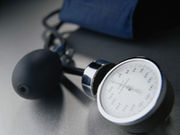Significantly higher nighttime systolic BP, especially in patients with diabetes and low eGFR
MONDAY, Aug. 22, 2016 (HealthDay News) — For patients with hypertension, albuminuria is associated with higher nighttime systolic blood pressure (SBP), according to a study published online Aug. 11 in Diabetes Care.
Gema Ruiz-Hurtado, Ph.D., from the Hospital Universitario 12 de Octubre in Madrid, and colleagues examined the quantitative differences in nighttime SBP across albuminuria levels in patients with and without diabetes and chronic kidney disease. Data were analyzed for 16,546 patients from the Spanish Ambulatory BP Monitoring Registry cohort. Patients were classified according to estimated glomerular filtration rate (eGFR) and urine albumin-to-creatinine ratio.
The researchers observed a statistically significant and clinically substantial higher nighttime SBP for high albuminuria (6.8 mm Hg higher than with normoalbuminuria; P < 0.001). The correlation was particularly strong for patients with diabetes and low eGFR at very high albuminuria (16.5 mm Hg; P < 0.001). Nighttime SBP was 4.8 mm Hg higher in patients with high albuminuria versus normoalbuminuria (P < 0.001) and 6.1 mm Hg higher for those with very high albuminuria versus high albuminuria (P < 0.001), after full adjustment for demographic, lifestyles, and clinical characteristics. Among patients without diabetes, these differences were 3.8 and 3.1 mm Hg, respectively, while among patients with diabetes, the differences were 6.5 and 8.0 mm Hg, respectively.
“Albuminuria in hypertensive patients is accompanied by quantitatively striking higher nighttime SBP, particularly in those with diabetes with very high albuminuria and low eGFR,” the authors write.
The Spanish Ambulatory BP Monitoring Registry cohort is maintained by an unrestricted grant from Lacer Laboratorie.
Full Text (subscription or payment may be required)
Copyright © 2016 HealthDay. All rights reserved.








